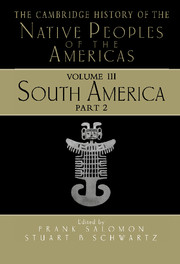Book contents
- Frontmatter
- Contents
- Illustrations
- 14 The Crises and Transformations of Invaded Societies: The La Plata Basin (1535–1650)
- 15 The Colonial Condition in the Quechua-Aymara Heartland (1570–1780)
- 16 Warfare, Reorganization, and Readaptation at the Margins of Spanish Rule: The Southern Margin (1573–1882)
- 17 The Western Margins of Amazonia from the Early Sixteenth to the Early Nineteenth Century
- 18 Warfare, Reorganization, and Readaptation at the Margins of Spanish Rule – The Chaco and Paraguay (1573–1882)
- 19 Destruction, Resistance, and Transformation – Southern, Coastal, and Northern Brazil (1580–1890)
- 20 Native Peoples Confront Colonial Regimes in Northeastern South America (c. 1500–1900)
- 21 New Peoples and New Kinds of People: Adaptation, Readjustment, and Ethnogenesis in South American Indigenous Societies (Colonial Era)
- 22 The “Republic of Indians” in Revolt (c. 1680–1790)
- 23 Andean Highland Peasants and the Trials of Nation Making during the Nineteenth Century
- 24 Indigenous Peoples and the Rise of Independent Nation-States in Lowland South America
- 25 Andean People in the Twentieth Century
- 26 Lowland Peoples of the Twentieth Century
- Index
20 - Native Peoples Confront Colonial Regimes in Northeastern South America (c. 1500–1900)
Published online by Cambridge University Press: 28 March 2008
- Frontmatter
- Contents
- Illustrations
- 14 The Crises and Transformations of Invaded Societies: The La Plata Basin (1535–1650)
- 15 The Colonial Condition in the Quechua-Aymara Heartland (1570–1780)
- 16 Warfare, Reorganization, and Readaptation at the Margins of Spanish Rule: The Southern Margin (1573–1882)
- 17 The Western Margins of Amazonia from the Early Sixteenth to the Early Nineteenth Century
- 18 Warfare, Reorganization, and Readaptation at the Margins of Spanish Rule – The Chaco and Paraguay (1573–1882)
- 19 Destruction, Resistance, and Transformation – Southern, Coastal, and Northern Brazil (1580–1890)
- 20 Native Peoples Confront Colonial Regimes in Northeastern South America (c. 1500–1900)
- 21 New Peoples and New Kinds of People: Adaptation, Readjustment, and Ethnogenesis in South American Indigenous Societies (Colonial Era)
- 22 The “Republic of Indians” in Revolt (c. 1680–1790)
- 23 Andean Highland Peasants and the Trials of Nation Making during the Nineteenth Century
- 24 Indigenous Peoples and the Rise of Independent Nation-States in Lowland South America
- 25 Andean People in the Twentieth Century
- 26 Lowland Peoples of the Twentieth Century
- Index
Summary
There already exist a number of basic chronological narratives of the course of the European occupation of northeastern South America from the Amazon to the Caribbean, but even where the fate of the native population is the focus of such accounts, little is said of changes occurring in the cultural and social practices of those indigenous populations themselves. It is the intention of this chapter to remedy that situation. Accordingly chronological narrative is balanced by extended analysis of the longterm historical processes that generated the major events, otherwise so ably captured in these narratives. In short, while rehearsing in outline the key moments of European colonial advance, beginning with the initial encounters between Europeans and Native Americans and the various attempts at colonial establishment, the main emphasis is on indigenous social process over the long term.
Until around the 1650s these attempts took place in two broad zones of colonial interest and activity: the lower Amazon River including the Maranhao captaincy on the one hand, and the lower Orinoco, coastal Guayana, and the Lesser Antilles on the other. A period of seemingly unstoppable colonial advance followed, up to the 1750s, at which point the tensions between the metropolitan regimes and the growing indigenous colonial élite found significant expression in changing policies toward missionary activity among native peoples. Finally, South American nationalism and neo-colonialism in the late eighteenth and nineteenth centuries provided the backdrop to the final phase in the incorporation of native peoples into the modern state.
An extended discussion of issues in current research and debate prefaces this analytical narrative. The historical anthropology of native South America stands at an important crossroads, requiring it to discard the outmoded conceptions and assumptions of earlier scholarship. The main results of this new scholarship are presented via a consideration of the political, economic, and cultural character of native society at the turn of the fifteenth century. This baseline provides a context for the examination of the change and innovation that occurred over the subsequent four centuries and permit, in conclusion, some assessment to be made of the genetic, social, and cultural continuities and disjunctures among native South Americans, then and now.
- Type
- Chapter
- Information
- The Cambridge History of the Native Peoples of the Americas , pp. 382 - 442Publisher: Cambridge University PressPrint publication year: 1999
- 16
- Cited by



